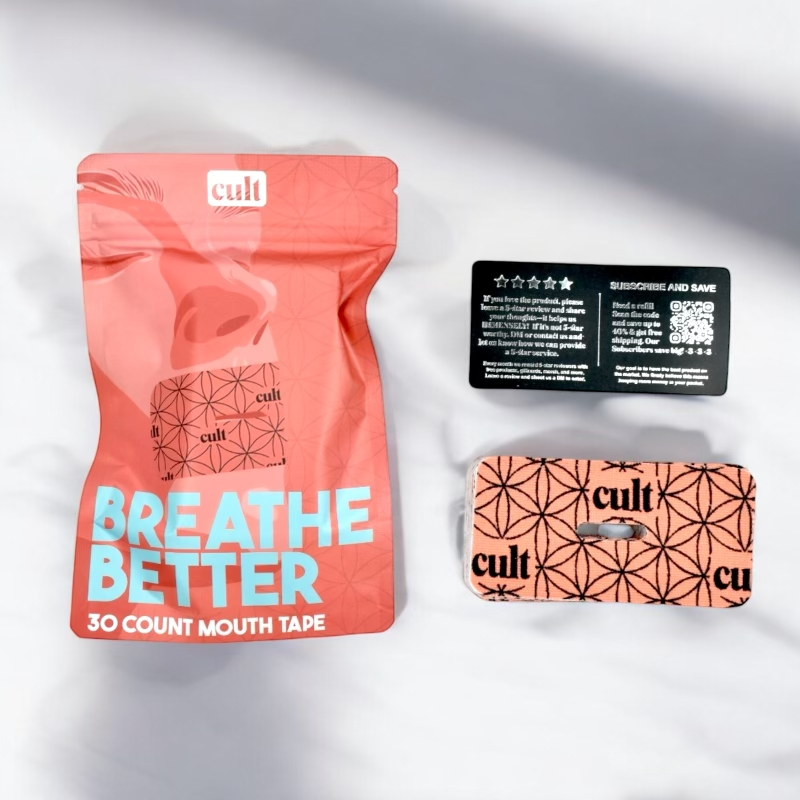
Mouth Tape: Is It Safe?
Share
Mouth tape might sound like an unusual sleep hack, but more people are turning to it in search of better rest. The concept is simple—tape your mouth shut at night to encourage nasal breathing, which is widely regarded as healthier than mouth breathing during sleep. But the real question is: is mouth tape safe?
There’s a lot of curiosity and a fair amount of skepticism around this trend. For some, the idea of sealing their mouth shut sounds uncomfortable, even risky. But when done properly, mouth taping is generally safe for most people and can lead to improved sleep quality and overall health. Let’s dive into how it works, why it’s beneficial, and what you need to consider before trying it.
Why Mouth Taping?
First, let’s talk about why people are taping their mouths shut in the first place. The main goal is to switch from mouth breathing to nose breathing during sleep. Breathing through the nose offers several health benefits, including:
- Better Oxygenation: Nasal breathing helps the body take in oxygen more efficiently than mouth breathing.
- Reduced Snoring: Mouth breathers are more likely to snore, and switching to nasal breathing can reduce snoring and help partners sleep better too.
- Improved Sleep Quality: By promoting deeper, more rhythmic breathing, nasal breathing can help you sleep more soundly.
- Moisturized Airways: Breathing through the nose humidifies and filters the air, reducing dryness and irritation in the throat and mouth.
Mouth taping is a simple method to reinforce nasal breathing overnight, especially for people who habitually breathe through their mouths. For many, it has resulted in less snoring, better sleep, and even improved energy levels upon waking.
Follow Us on TikTok
@jointhecultco Mouth taping carries risk. Heres whay you need to know The tape i use is @BreatheBetter CULT #mouthtapingforsleep #mouthtaping ♬ original sound - Breathe Better CULT
Addressing the Safety Concerns
Understandably, people have concerns about whether taping their mouths shut at night is safe. The good news is that, for the vast majority of users, mouth taping is safe—but it’s important to use the right technique and tools. Here’s what you need to know:
-
Sleep Apnea and Breathing Conditions
If you have severe obstructive sleep apnea (OSA) or any other condition that interferes with breathing, it’s crucial to consult a healthcare professional before using mouth tape. OSA sufferers sometimes need to breathe through their mouths during sleep because their airways temporarily block. Taping the mouth in these cases could worsen breathing problems. However, for those without significant breathing issues, mouth taping can actually help prevent mild cases of sleep apnea by promoting steady nasal breathing. -
Nasal Congestion
If you frequently have nasal congestion, taping your mouth while your nose is blocked can feel suffocating. Always make sure your nasal passages are clear before using mouth tape. A quick rinse with a saline spray or using nasal strips can help open the airways and ensure comfortable nasal breathing throughout the night. -
Choosing the Right Tape
Safety with mouth taping largely depends on the tape you use. Don’t reach for duct tape or household adhesives! The safest option is medical-grade paper tape or specially designed mouth tapes like Breathe Better Cult, which are gentle on the skin and made specifically for this purpose. These tapes allow you to peel them off easily in the morning without damaging your skin or causing irritation. -
Skin Sensitivity
Some people have concerns about skin irritation from mouth tape. While it’s possible to experience slight discomfort or redness, using medical-grade tape reduces the likelihood of irritation. If you have sensitive skin, test the tape during the day for an hour or two before committing to overnight use. -
Panic or Anxiety
A small percentage of users report feeling anxious or panicked while having their mouths taped shut. If this happens to you, start gradually by taping your mouth for short periods while awake to get accustomed to the feeling. Over time, most people find it easy to adapt and don’t experience anxiety once they’ve become used to the sensation.
How to Mouth Tape Safely
If you’re ready to try mouth taping but want to ensure you do it safely, follow these best practices:
-
Use Proper Tape
Stick to medical-grade paper tape or mouth strips specifically made for taping your mouth. Avoid stronger adhesives that could harm your skin. -
Clear Nasal Passages
Make sure you can comfortably breathe through your nose before taping. If you’re congested, use a saline spray, nasal strips, or another remedy to open your airways. -
Start Slow
If you’re nervous about taping your mouth shut for an entire night, start by wearing the tape for shorter periods during the day. This will help you get used to the sensation. -
Remove the Tape Gently
In the morning, take the tape off carefully to avoid irritating the skin around your mouth. A little warm water can help if the tape feels sticky.
The Benefits of Mouth Taping
Now that we’ve covered safety concerns, let’s look at why mouth taping is gaining popularity. Here are some of the key benefits people experience:
- Improved Sleep Quality: By encouraging nasal breathing, you may sleep more soundly and wake up feeling more refreshed.
- Less Snoring: Mouth breathers often snore, disturbing both their own and their partner’s sleep. Mouth taping can significantly reduce or eliminate snoring by keeping the airway clear.
- Healthier Breathing: Breathing through the nose filters air, adds moisture, and reduces the intake of allergens. It also regulates airflow, promoting better oxygen exchange and reducing the risk of hyperventilation.
- Reduced Dry Mouth and Bad Breath: Mouth breathing can dry out your mouth and throat, leading to discomfort and bad breath in the morning. Nasal breathing, encouraged by mouth tape, keeps your mouth moist and fresh.
Who Should Avoid Mouth Taping?
While mouth taping is safe for most people, it may not be suitable for everyone. People with the following conditions should avoid it or speak to their doctor before trying:
- Moderate to Severe Sleep Apnea: Those with untreated OSA should seek medical advice before attempting mouth taping.
- Severe Nasal Congestion: If you regularly experience nasal blockages that make it difficult to breathe through your nose, addressing the congestion should be the priority.
- Panic or Anxiety Disorders: If taping your mouth triggers feelings of suffocation or panic, it may not be the right solution for you.
Final Thoughts: Is Mouth Taping Safe?
In most cases, mouth taping is perfectly safe when done correctly. It’s a simple, non-invasive way to improve sleep quality, reduce snoring, and promote healthier breathing habits. However, as with any health practice, it’s important to listen to your body and consult with a healthcare provider if you have any pre-existing conditions or concerns.
If you’re struggling with mouth breathing and its effects on your sleep, mouth taping could be the natural solution you’ve been looking for. Just remember to start slow, use the right materials, and ensure your nasal passages are clear before taping up. Your best night’s sleep could be just a piece of tape away!

